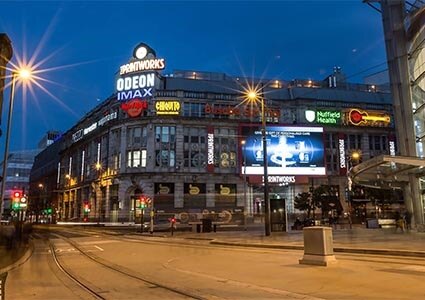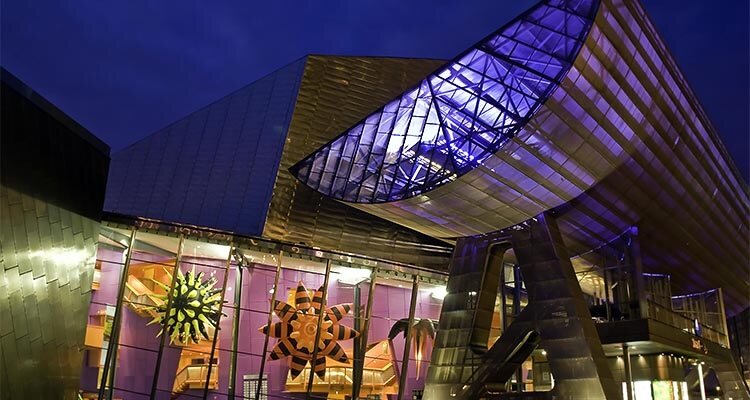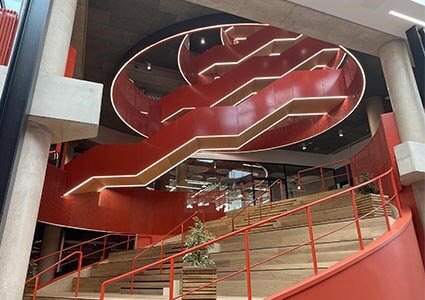Discover how HFL Building Solutions redefines maintenance with energy efficiency and sustainability
Standing as one of the UK’s foremost building services companies, HFL Building Solutions Ltd (HFL) offers planned and reactive maintenance to a wide range of sectors ensuring buildings are safe, compliant and energy efficient. HFL boasts an enviable reputation for the reliable delivery of cost and energy efficient building management, alongside operational and technical solutions for businesses of all shapes and sizes. From retail parks to leisure complexes, educational establishments to commercial properties, the company holds all the industry accreditations and insurances to ensure projects are completed safely and on time. Dave Saxton, Managing Director at HFL, sheds light on the business’ history.
 “With nearly 19 years of operation under its belt, HFL was originally conceived by me. Back in the day, I was an electrical and mechanical engineer who grew tired of traveling around the world for work. Upon coming back to the UK, I worked for a maintenance company and began thinking of establishing my own maintenance business. Subsequently, I joined forces with three engineers who owned a successful company, leading to the creation of HFL in 2005. Together, we built the business from the ground up, achieving a turnover of around £4 million within our first four years. After repaying all our loans, we secured an investor and expanded our team by hiring sales and administration personnel, thus further propelling our growth. In this industry, work follows people, so we brought along numerous contacts I had established strong relationships with at my previous company. Today, HFL still specialises in the mechanical and electrical maintenance of properties,” he begins.
“With nearly 19 years of operation under its belt, HFL was originally conceived by me. Back in the day, I was an electrical and mechanical engineer who grew tired of traveling around the world for work. Upon coming back to the UK, I worked for a maintenance company and began thinking of establishing my own maintenance business. Subsequently, I joined forces with three engineers who owned a successful company, leading to the creation of HFL in 2005. Together, we built the business from the ground up, achieving a turnover of around £4 million within our first four years. After repaying all our loans, we secured an investor and expanded our team by hiring sales and administration personnel, thus further propelling our growth. In this industry, work follows people, so we brought along numerous contacts I had established strong relationships with at my previous company. Today, HFL still specialises in the mechanical and electrical maintenance of properties,” he begins.
Profitable partnerships
As HFL’s main founder, Dave shares his perspective on how the company’s strategy for success has evolved since its inception. “Until three weeks ago [at time of writing], I was one of four owners of the company. My wife and I decided, however, to buy out the other three shareholders, meaning that HFL is now family-owned, with our three children also working with us. HFL serves two types of clients in the industry. The first type is end users who own their own buildings, such as Alton Towers; then, there are managing agents who oversee a portfolio of buildings, which allows us to win maybe a dozen projects at once by securing a contract with them. To ensure our growth, our strategy is to pursue endeavours with both types of clients. Nonetheless, managing agents do lead to quicker project wins on some extremely prestigious buildings. Our strategy lies in prioritising the clients with whom we have previously worked and developing strong relationships. These clients generally have multiple buildings where we can highlight our high level of service, affordability, and honesty as a company. Maintaining our reputation is crucial to us and we take responsibility for every mistake made, striving to make it right,” he emphasises.
Service driven
Moving on, Dave elaborates on HFL’s current operational footprint. “Most of our work encompasses commercial and light industrial premises, delivering our services to small industrial units like shopping centres, theatres, museums and more. However, we do not dabble in domestic properties or large industrial plants. With a workforce of nearly 150 talented individuals, HFL boasts an annual turnover of around £18 million. In addition to our headquarters in Denton, Manchester, our staff is stationed across offices in Leeds, Newcastle, Liverpool, Birmingham, and Cardiff. Despite attempting to enter the London market a few years ago, it proved commercially non-viable, leading us to prioritise other regions beyond the M25,” he enlightens.
Across this variety of sectors and geographical markets, HFL has garnered an enviable reputation for the unique services it provides. “Just like cars need to pass their MOT to be allowed on the road, buildings must comply with statutory legislation and requirements before they can be occupied. This includes fire alarm testing, water inspections, and gas checks. HFL’s mission is to ensure buildings meet these regulatory standards, making electrical and heating, ventilation, and air conditioning (HVAC) services our core business. Furthermore, we oversee water hygiene in-house, and actively participate in various projects. Notably, we undertake numerous boiler replacement projects,” Dave adds.
Specialist services
Dave describes the practical application of these services across a variety of projects HFL has been involved in. “Presently, our team is engaged in boiler-related projects at renowned locations such as The Lowry theatre and art galleries in Salford Quays. Moreover, we are completing an asset tagging scheme for the Football Association (FA) at Saint George’s Park, the home of English football. Asset tagging consists in affixing NFC tags to our clients’ assets, which link to a database containing detailed information about the equipment’s maintenance history, existing problems, and any recurring issues which would signal that the asset needs to be investigated further. In essence, asset tagging enables customers to better identify assets getting towards the end of their useful life and require replacement. The rest of our projects primarily focus on air conditioning replacements, as we specialise in asset replacement rather than new builds,” he states.
Dedicated energy division 
As sustainability continues to be at the centre of conversations across all industries, Dave explains how HFL embraces sustainable practices and inspires its clients to do the same. “Virtually all our vehicles are now hybrid, with some fully electrics in operation where suitable. Nonetheless, given the extensive daily mileage covered by our engineers, our best option remains hybrid vehicles, as the infrastructure for electric vehicles is not yet fully developed to meet all our needs – an issue affecting many of our competitors, too. In addition, our head office is equipped with solar panels on the roof, generating an impressive 49 kilowatt-hours of renewable energy.
“At HFL, sustainability is taken very seriously and so, we have established a dedicated energy division with an in-house expert advising our clients on eco-friendly technologies. Embracing such technologies can be challenging since many of our clients are facing financial constraints due to the lingering effects of the pandemic. They are aware of what they need to do to improve, but they struggle to find the necessary funds. Because government grants are limited, we assist our customers by recommending other companies that can help them. For instance, we partnered with a Spanish company – whose name we cannot mention – which specialises in lighting for large premises. We recommended this company to a chain of stores that was refurbishing all its locations to enhance their sustainability. Our partner visited each store, and upon surveying all the rooms suggested installing solar panels on the roofs, using battery storage, and replacing the existing lighting with LED lights. As implementing these changes throughout all the stores would cost tens of millions of pounds, our partner offered a special payment plan to the chain. They covered the upfront costs of the project themselves, and the chain will repay them over time using the savings generated from using the new technologies. Simply put, it’s almost like receiving a free upgrade because the client doesn’t have to pay more than they did for their old lighting. Furthermore, as a gesture of goodwill, HFL helped manage the project for free, hoping that this will lead to more opportunities to work together in the future,” he continues.
Growth trajectory
As our interview nears its end, Dave reveals HFL’s core priorities both now and into the future. “We take great pride in the fact that we did not sell HFL and instead maintained ownership as we navigated our path to success – even if that meant exhausting our funds for the buyout. To sustain our success, we are actively seeking opportunities to engage in more trade and corporate events which will enable us to connect with a wider network of businesses. One notable upcoming event we plan to attend is ran by the CIBSE (Chartered Institute of Building Services Engineers). Unfortunately, such events were halted since the start of the pandemic, but we are committed to start organising, sponsoring, and attending these events again to forge new relationships. In terms of investments, we are considering acquiring additional properties in the next few years. Indeed, as our company expands, there will likely come a time when we require a new head office. Therefore, we are currently limiting our investments to ensure we have a solid foundation to support this future endeavour,” he says.
Having built HFL from the ground up through dedication and client-focused services, Dave is now poised to take the business to new heights. “The coming months will be dedicated to furthering our growth and positioning ourselves favourably for the future. We already have a healthy work pipeline in place, expected to generate earnings of £2 million to £3 million without having to actively seek more projects,” he ends.
www.hflbuildingsolutions.co.uk

